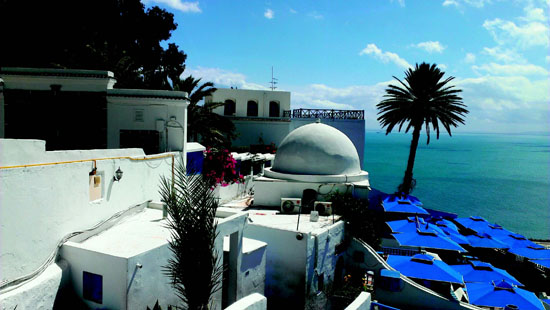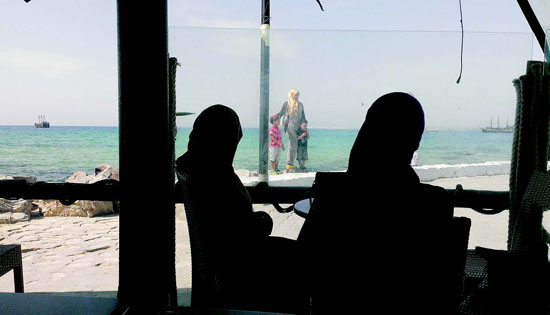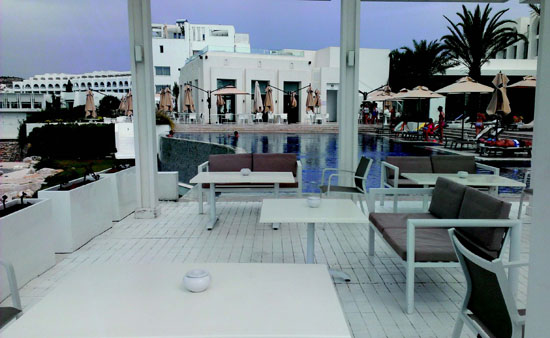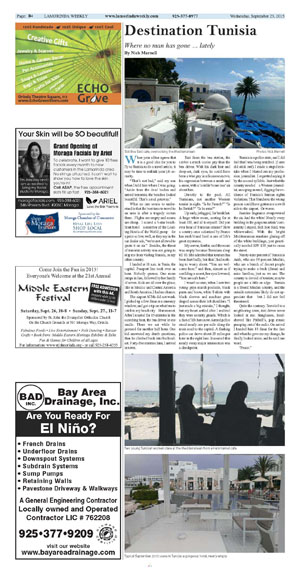|
|
Published September 23rd, 2015
|
Destination Tunisia
|
| Where no man has gone ... lately |
| By Nick Marnell |
 |
| Sidi Bou Said cafe, overlooking the Mediterranean Photos Nick Marnell |
When your editor agrees that it is a good idea for you to fly to Tunisia to do a travel article, it may be time to rethink your job security.
 "That's not bad," said my son when I told him where I was going. "Aside from the dead bodies and armed terrorists, the beaches looked beautiful. That's a real getaway."
"That's not bad," said my son when I told him where I was going. "Aside from the dead bodies and armed terrorists, the beaches looked beautiful. That's a real getaway."
 What no one seems to understand is that the best time to travel to an area is after a tragedy occurs there. Flights are empty and rooms are cheap. I scored a 5-star beachfront hotel - a member of the Leading Hotels of the World group - for a price so low, well, as they say in the car dealer ads, "we're not allowed to quote it on air." Besides, the threat of terrorist activity was not going to stop me from visiting Tunisia, or any other country.
What no one seems to understand is that the best time to travel to an area is after a tragedy occurs there. Flights are empty and rooms are cheap. I scored a 5-star beachfront hotel - a member of the Leading Hotels of the World group - for a price so low, well, as they say in the car dealer ads, "we're not allowed to quote it on air." Besides, the threat of terrorist activity was not going to stop me from visiting Tunisia, or any other country.
 I landed at 11 a.m. in Tunis, the capital. Passport line took over an hour. Nobody queues. One mom jumps in line, followed by her family of seven. Kids are all over the place, like in Mexico and Central America and South America. I had no chance.
I landed at 11 a.m. in Tunis, the capital. Passport line took over an hour. Nobody queues. One mom jumps in line, followed by her family of seven. Kids are all over the place, like in Mexico and Central America and South America. I had no chance.
 The airport ATMs did not work. I picked up a few dinar at a currency window, and got a tip on what bus to catch to my beach city - Hammamet. After I roasted for 15 minutes in the scorching heat, the bus driver let me inside. There we sat while he groused for another half hour. One kid answered my dumb questions, then he climbed back into his headset. Forty-five minutes later, I arrived in town.
The airport ATMs did not work. I picked up a few dinar at a currency window, and got a tip on what bus to catch to my beach city - Hammamet. After I roasted for 15 minutes in the scorching heat, the bus driver let me inside. There we sat while he groused for another half hour. One kid answered my dumb questions, then he climbed back into his headset. Forty-five minutes later, I arrived in town.
 Taxi from the bus station, the cabbie a much cooler guy than the bus driver. With his dark hair and deep-set, dark eyes, he could have been a wise guy in a Scorsese movie, his expression between a smirk and a sneer, with a 'couldn't care less' air about him.
Taxi from the bus station, the cabbie a much cooler guy than the bus driver. With his dark hair and deep-set, dark eyes, he could have been a wise guy in a Scorsese movie, his expression between a smirk and a sneer, with a 'couldn't care less' air about him.
 Directly to the pool. All Tunisians, not another Western tourist in sight. "Is he French?" "Is he British?" "Is he nuts?"
Directly to the pool. All Tunisians, not another Western tourist in sight. "Is he French?" "Is he British?" "Is he nuts?"
 Up early, jetlagged, for breakfast. A huge white room, seating for at least 100, and all to myself. Did you ever hear of Tunisian cuisine? How a country once colonized by France has such bland food is one of life's great mysteries.
Up early, jetlagged, for breakfast. A huge white room, seating for at least 100, and all to myself. Did you ever hear of Tunisian cuisine? How a country once colonized by France has such bland food is one of life's great mysteries.
 My server, Souhir, said the room was empty because Tunisians sleep till 10. She admitted that tourism has been hurt badly, but that I had nothing to worry about. "You are welcome here," and then, almost as if confiding a secret, her eyes lowered, "You are safe here."
My server, Souhir, said the room was empty because Tunisians sleep till 10. She admitted that tourism has been hurt badly, but that I had nothing to worry about. "You are welcome here," and then, almost as if confiding a secret, her eyes lowered, "You are safe here."
 I wasn't so sure, when I saw two young guys march poolside, black pants and boots, white T-shirts with black sleeves and machine guns draped across their left shoulders. "I just made a big mistake," I thought, but my heart settled after I realized they were security guards. Which is a fact of life here now. Armed police stood nearly one per mile along the main road to the capital. A flashing police car drove about 20 miles per hour in the right lane. It seemed that nearly every major intersection was a checkpoint.
I wasn't so sure, when I saw two young guys march poolside, black pants and boots, white T-shirts with black sleeves and machine guns draped across their left shoulders. "I just made a big mistake," I thought, but my heart settled after I realized they were security guards. Which is a fact of life here now. Armed police stood nearly one per mile along the main road to the capital. A flashing police car drove about 20 miles per hour in the right lane. It seemed that nearly every major intersection was a checkpoint.
 Tunisia is a police state, and I did feel that I was being watched. (I sure did stick out!) I made a stupid mistake when I blurted out my profession: journalist. I regretted saying it by the second syllable. Just what the country needed - a Western journalist, snooping around, digging for evidence of Tunisia's human rights violations. That blunder to the wrong person could have gotten me a swift ride to the airport. Or worse.
Tunisia is a police state, and I did feel that I was being watched. (I sure did stick out!) I made a stupid mistake when I blurted out my profession: journalist. I regretted saying it by the second syllable. Just what the country needed - a Western journalist, snooping around, digging for evidence of Tunisia's human rights violations. That blunder to the wrong person could have gotten me a swift ride to the airport. Or worse.
 Jasmine fragrance overpowered the air. And the white! Nearly every building in the gorgeous artists' community I stayed, Sidi Bou Said, was whitewashed. With the bright Mediterranean sunshine glaring off of the white buildings, you practically needed SPF 100 just to cross the street.
Jasmine fragrance overpowered the air. And the white! Nearly every building in the gorgeous artists' community I stayed, Sidi Bou Said, was whitewashed. With the bright Mediterranean sunshine glaring off of the white buildings, you practically needed SPF 100 just to cross the street.
 Ninety-nine percent of Tunisia is Arab, who are 99 percent Muslim, who are a bunch of decent people trying to make a buck (dinar) and raise families, just as we are. The country is devoid of tourists; maybe people are a little on edge - Tunisia is a liberal Muslim country, and the outside extremists likely do not appreciate that - but I did not feel threatened.
Ninety-nine percent of Tunisia is Arab, who are 99 percent Muslim, who are a bunch of decent people trying to make a buck (dinar) and raise families, just as we are. The country is devoid of tourists; maybe people are a little on edge - Tunisia is a liberal Muslim country, and the outside extremists likely do not appreciate that - but I did not feel threatened.
 Quite the contrary. Traveled to a neighboring town, taxi driver never looked at me. Sunglasses, headshaved like PitBull's, pop music pumping out of the radio. On arrival I handed him 10 dinar for the fare and when he gave me my change, he finally looked at me, and he said one word.
Quite the contrary. Traveled to a neighboring town, taxi driver never looked at me. Sunglasses, headshaved like PitBull's, pop music pumping out of the radio. On arrival I handed him 10 dinar for the fare and when he gave me my change, he finally looked at me, and he said one word.
 "Peace."
"Peace."

|
 |
| Two young Tunisian women stare at the Mediterranean from a Hammamet cafe |
 |
| Typical September 2015 scene in Tunisia: a gorgeous hotel, nearly empty |
|
|
|
|
| |
|
|
|
|





